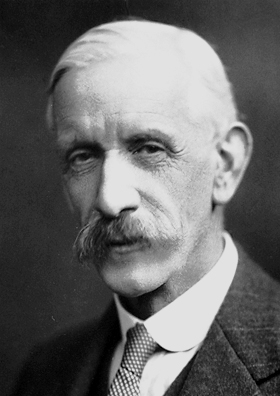Frederick Gowland Hopkins
British biochemist and Nobel laureate
Sir Frederick Gowland Hopkins (20 June 1861 – 16 May 1947) was a pioneering English biochemist who was awarded the Nobel Prize in Physiology or Medicine in 1929 for his discovery of vitamins. His work laid the foundation for the field of biochemistry and significantly advanced the understanding of nutrition and metabolism.
Early Life and Education[edit | edit source]
Frederick Gowland Hopkins was born in Eastbourne, Sussex, England. He was the eldest of eight children in a family with a strong interest in science and education. Hopkins attended the City of London School and later studied at University College London, where he developed an interest in chemistry. He completed his undergraduate studies in 1888 and went on to earn a doctorate in chemistry.
Career and Research[edit | edit source]
Hopkins began his career as a lecturer in physiology at Guy's Hospital in London. In 1898, he joined the University of Cambridge as a lecturer in chemical physiology. It was here that he conducted his groundbreaking research on the role of amino acids and enzymes in metabolism.
Discovery of Vitamins[edit | edit source]
Hopkins is best known for his discovery of vitamins, which he termed "accessory food factors." In 1912, he demonstrated that certain nutrients were essential for growth and health, leading to the identification of vitamins as crucial components of the diet. This discovery revolutionized the field of nutrition and led to the development of vitamin supplements.
Protein Metabolism[edit | edit source]
In addition to his work on vitamins, Hopkins made significant contributions to the understanding of protein metabolism. He discovered the amino acid tryptophan and elucidated its role in the body's metabolic processes. His research demonstrated that proteins are not only structural components of cells but also play a vital role in biochemical reactions.
Awards and Honors[edit | edit source]
In recognition of his contributions to science, Hopkins was awarded the Nobel Prize in Physiology or Medicine in 1929, which he shared with Christiaan Eijkman. He was also knighted in 1925 and received numerous other honors, including the Copley Medal from the Royal Society.
Legacy[edit | edit source]
Hopkins' work laid the groundwork for modern biochemistry and nutrition science. His discovery of vitamins has had a lasting impact on public health and has led to the prevention of numerous nutritional deficiencies. Today, he is remembered as one of the founding figures of biochemistry and a pioneer in the study of nutrition.
Related Pages[edit | edit source]
Search WikiMD
Ad.Tired of being Overweight? Try W8MD's NYC physician weight loss.
Semaglutide (Ozempic / Wegovy and Tirzepatide (Mounjaro / Zepbound) available. Call 718 946 5500.
Advertise on WikiMD
|
WikiMD's Wellness Encyclopedia |
| Let Food Be Thy Medicine Medicine Thy Food - Hippocrates |
Translate this page: - East Asian
中文,
日本,
한국어,
South Asian
हिन्दी,
தமிழ்,
తెలుగు,
Urdu,
ಕನ್ನಡ,
Southeast Asian
Indonesian,
Vietnamese,
Thai,
မြန်မာဘာသာ,
বাংলা
European
español,
Deutsch,
français,
Greek,
português do Brasil,
polski,
română,
русский,
Nederlands,
norsk,
svenska,
suomi,
Italian
Middle Eastern & African
عربى,
Turkish,
Persian,
Hebrew,
Afrikaans,
isiZulu,
Kiswahili,
Other
Bulgarian,
Hungarian,
Czech,
Swedish,
മലയാളം,
मराठी,
ਪੰਜਾਬੀ,
ગુજરાતી,
Portuguese,
Ukrainian
Medical Disclaimer: WikiMD is not a substitute for professional medical advice. The information on WikiMD is provided as an information resource only, may be incorrect, outdated or misleading, and is not to be used or relied on for any diagnostic or treatment purposes. Please consult your health care provider before making any healthcare decisions or for guidance about a specific medical condition. WikiMD expressly disclaims responsibility, and shall have no liability, for any damages, loss, injury, or liability whatsoever suffered as a result of your reliance on the information contained in this site. By visiting this site you agree to the foregoing terms and conditions, which may from time to time be changed or supplemented by WikiMD. If you do not agree to the foregoing terms and conditions, you should not enter or use this site. See full disclaimer.
Credits:Most images are courtesy of Wikimedia commons, and templates, categories Wikipedia, licensed under CC BY SA or similar.
Contributors: Prab R. Tumpati, MD

